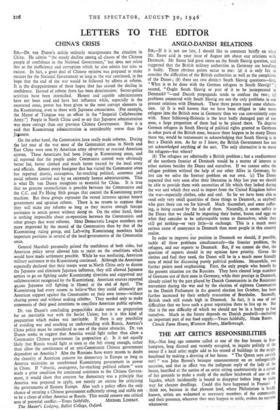LETTERS TO THE EDITOR
CHINA'S CRISIS SIR,-Dr. van Dusen's article seriously misrepresents the situation in China. He admits "the steady decline among all classes of the Chinese people of confidence in the National Government," but does not relate this to the inefficiency and corruption which he also admits but tries to excuse. In fact, a great deal of Chinese opinion was prepared to make excuses for the National Government so long as the war continued, in the hope that the end of the war would be followed by efforts at reform. It is the disappointment of these hopes that has caused the decline in confidence. Instead of reform there has been deterioration. Secret-police activities have been intensified. Honest and capable administrators have not been used and have lost influence while, especially in the recovered areas, power has been given to the most corrupt elements in the Kuomintang, even to those with Japanese connections. (For example, the Mayor of Tsingtao was an officer in the "Imperial Collaboration Army.") People in North China used to say that Japanese administration was more corrupt than any previous Chinese Government. Now it is said that Kuomintang administration is considerably worse than the Japanese.
On the other hand, the Communists have really made reforms. During the last year of the war most of the Communist areas in North and East China were seen by American army observers or rescued American airmen. These Americans had been living in Kuomintang areas, and all reported that the people under Communist control were obviously better fed, better clothed and much better treated by the local army and officials. Almost every foreigner that has visited the Communist areas has reported drastic, courageous, far-reaching political, economic and social reforms carried out by an extremely honest administration. This is what Dr. van Dusen recognises as essential for China. It is true that no genuine reconciliation is possible between the Communists and the C.C. and Fu Hsing Shih groups that control the Kuomintang party machine. But these groups represent the vested interests against honest government and agrarian reform. There is no reason to suppose that they will make any reforms so long as they receive enough foreign assistance to retain power without doing so. On the other hand, there is nothing impossible about co-operation between the Communists and other groups that want reforms. Most Democratic League members are more impressed by the record of the Communists than by that of the Kuomintang ruling group, and Left-wing Kuomintang members hold important positions in several of the local governments of the Communist areas.
General Marshall personally gained the confidence of both sides, but American policy never allowed him to insist on the conditions which would have made settlement possible. While he was mediating, American military assistance to the Kuomintang continued. Although the Americans repeatedly declared that their troops went to North China only to disarm the Japanese and eliminate Japanese influence, they still allowed Japanese armies to go on fighting under Kuomintang direction and supported any collaborationist recognised by the Kuomintang. American sources reported 40,000 Japanese still fighting in Shansi at the end of April. The Kuomintang had every reason to believe hat they 'could ultimately get American support against the Communists on their own terms—without sharing power and without making reforms. They needed only to make statements of their good intentions to conciliate American public opinion.
Dr. van Dusen's concluding propositions make sense as preparation for an inevitable war with the Soviet Union; but it is this kind of preparation which makes war inevitable. If there is any possibility of avoiding war and reaching an understanding with Russia, America's China policy must be considered as one of the major obstacles. Dr. van Dusen seems to suggest that America would fight rather than allow a Communist Chinese government (in proposition 4). Is it not equally likely that Russia would fight as soon as she felt strong enough, rather than allow the continuance of an anti-Communist Chinese government dependent on America ? Also the Russians have every reason to doubt the sincerity of American concern for democracy in Europe so long as America maintains an unreformed Kuomintang government in power in China. If "drastic, courageous, far-reaching political reform" were made a prior condition for continued assistance to the Chinese Govern- ment, it would show that concern for democracy was a principle that America was prepared to apply, not merely an excuse for criticising the governments of Eastern Europe. Also such a policy offers the only chance of securing a Chinese government sufficiently strong and stable not to be a client of either America or Russia. This would remove one critical area of potential conflict —Yours faithfully, MICHAEL LINDSAY. The Master's Lodging, Balliol College, Oxford.


























 Previous page
Previous page